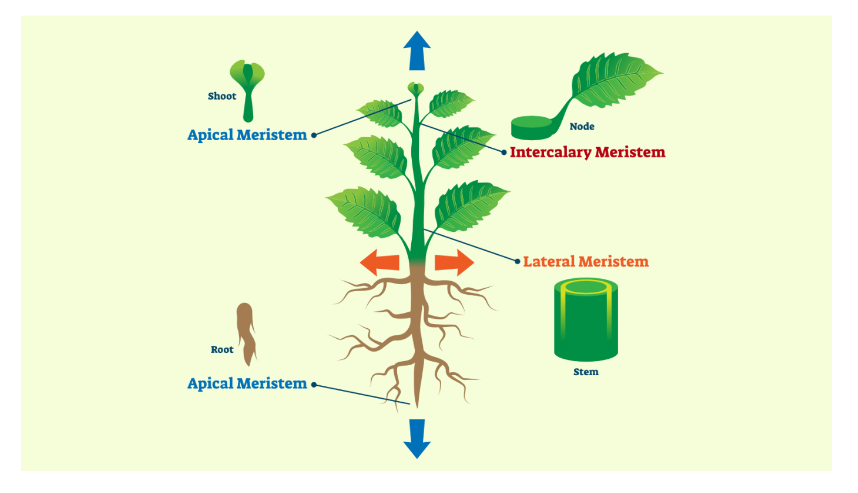Table of Contents
Introduction to Meristematic Tissue
In the captivating world of plants, growth is not a mere occurrence but a complex and orchestrated process. At the heart of this process lies a remarkable tissue known as meristem, which serves as the epicenter of growth and development.
Understanding Meristem
Meristem, derived from the Greek word “merizein” meaning “to divide,” is a group of undifferentiated cells found in the growing regions of plants. These cells possess the unique ability to divide and specialize, creating a diverse array of cell types that form the foundation of plant organs. Meristem is akin to a master conductor, orchestrating the symphony of plant growth and adaptation.

Characteristics of Meristematic Tissues
Rapid Cell Division: Meristematic cells exhibit rapid and continuous cell division, fuelling the growth of plants.
Small, Isodiametric Cells: These cells are relatively small and uniform in size, allowing for efficient division.
Thin Cell Walls: Thin cell walls facilitate easier cell division and enable the movement of nutrients between cells.
Lack of Vacuoles: Unlike mature cells, meristematic cells have minimal vacuoles, maximizing space for division and growth.
Large Nucleus-to-Cytoplasm Ratio: The nucleus plays a crucial role in regulating cell division and differentiation, resulting in a high nucleus-to-cytoplasm ratio in meristematic cells.
Also Check For:
Classification (Types) of Meristem
Based on Origin and Development:
Promeristem: The initial cells that give rise to primary meristems.
Primary Meristem: Responsible for the formation of primary tissues like epidermis, ground tissues, and vascular tissues.
Secondary Meristem: Includes vascular cambium and cork cambium, contributing to secondary growth (thickening) in plants.
Based on Location:
Apical Meristem: Found at the tips of stems and roots, driving primary growth and elongation.
Intercalary Meristem: Situated at the base of leaves and stems, aiding in growth after injury or grazing.
Lateral Meristem: Also known as cambium, these meristems are responsible for secondary growth in stems and roots.
Frequently Asked Questions on Meristematic Tissue
What is the role of meristem in plants?
Meristem is responsible for cell division, growth, and differentiation, giving rise to various plant organs and structures.
Where is apical meristem located?
Apical meristems are located at the tips of stems and roots, driving elongation.
What is secondary growth, and which meristem is responsible for it?
Secondary growth involves increasing the girth of stems and roots. Lateral meristems, such as vascular cambium and cork cambium, contribute to this process.
How does meristem contribute to plant adaptation?
Meristem allows plants to respond to environmental changes by generating new tissues and structures as needed.
Name the two main classifications of meristematic tissue based on origin and development. Provide examples of each.
The two main classifications are: Primary Meristem: These give rise to the primary tissues of plants. Examples include the apical meristem at the tips of stems and roots and the intercalary meristem found at the base of leaves and stems. Secondary Meristem: These contribute to secondary growth, leading to the thickening of stems and roots. Examples are the vascular cambium and the cork cambium.
Describe the characteristics of meristematic tissue.
Meristematic tissue exhibits the following characteristics:
Rapid cell division
Small, isodiametric cells
Thin cell walls
Lack of large vacuoles
High nucleus-to-cytoplasm ratio






